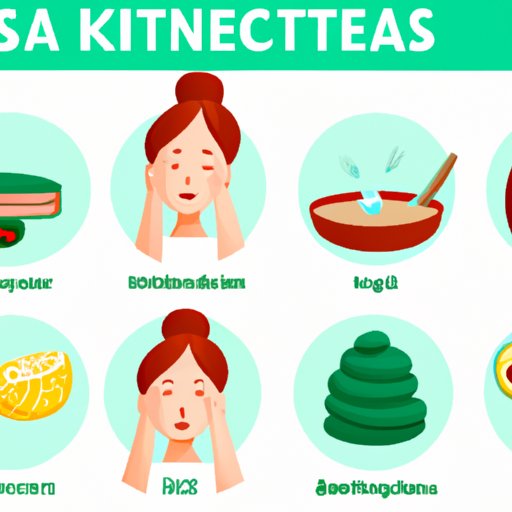
Introduction
Stress, hormonal changes, and a variety of other factors can contribute to acne. Stress acne, in particular, is caused by an increase in cortisol levels, which promotes the production of oil on the skin. This excess oil can clog pores, leading to acne breakouts.
Mindful Skincare Routine
A mindful skincare routine is essential to maintaining healthy, glowing skin, and it can also help alleviate stress acne. Be mindful of the steps you take to cleanse, tone, and moisturize your face. Start with a gentle cleanser to remove dirt and oil. Next, use a toner to balance the pH level of your skin. Finally, apply a moisturizer to hydrate and protect your skin.
In addition to these steps, massaging the face with essential oils can help reduce stress acne. Try using lavender, tea tree, or peppermint oil, which have antibacterial and anti-inflammatory properties. Gently massage the oil into your skin in a circular motion and then rinse off. Repeat this process a few times a week to see the best results.
Relaxation Techniques
Relaxation techniques can help reduce stress and, in turn, prevent stress acne. There are several different techniques to try, including meditation, deep breathing, and yoga. Each technique works in a different way to calm the mind and reduce stress levels.
Meditation, for example, trains the mind to focus on the present moment and encourages deep relaxation. Deep breathing, on the other hand, helps to slow down the heart rate and reduce anxiety. Yoga combines both meditation and deep breathing with physical movement, making it a great all-around stress-relieving activity.
You can incorporate these techniques into your daily life by setting aside a few minutes each day to practice them. Take a few deep breaths before starting your day, or try meditating before bed to help you relax and fall asleep.
Diet Changes
Your diet can also play a significant role in the health of your skin. It’s essential to eat a balanced diet that includes plenty of fruits and vegetables. Foods high in antioxidants, such as berries and leafy greens, can help reduce inflammation and protect against free radical damage.
Avoiding processed and fried foods can also help. These types of foods can raise insulin levels and lead to an increase in oil production. Additionally, drinking plenty of water is essential to keep your skin hydrated and prevent stress acne from occurring.
Finally, caffeine can have an impact on the health of your skin. While it’s fine in moderation, consuming too much caffeine can raise stress levels, leading to more stress acne. Try to limit your caffeine intake to one or two cups of coffee or tea per day.
Professional Treatment Options
If you have severe stress acne, you may want to explore professional treatment options. Chemical peels and light therapy are two popular options. Chemical peels use a solution to remove the top layer of skin, promoting the growth of new, healthy skin cells. Light therapy, on the other hand, uses a specific wavelength of light to kill bacteria and reduce inflammation.
If you’re considering seeking professional help, it’s important to speak with a dermatologist to determine the best course of action for your specific situation. Each treatment option has benefits and drawbacks, and only a dermatologist can provide the guidance you need.
Herbal Remedies
If you’re looking for alternative skincare solutions for stress acne, consider incorporating herbs and plants into your routine. Chamomile, green tea, and aloe vera are just a few examples of plants that can help alleviate stress acne.
Chamomile has anti-inflammatory properties and can also help soothe irritated skin. Green tea is high in antioxidants, and aloe vera has antibacterial properties to help reduce inflammation.
There are several different ways you can incorporate these plants into your skincare routine. Try brewing a cup of green tea and using it as a toner, or mixing a few drops of chamomile essential oil into your moisturizer.
Conclusion
Stress acne can be frustrating to deal with, but there are several ways to get rid of it and keep your skin healthy. Adopting a mindful skincare routine, practicing relaxation techniques, making dietary changes, exploring professional treatment options, and using herbal remedies are all viable options.
We encourage you to try out one or more of these techniques to see what works best for you.




